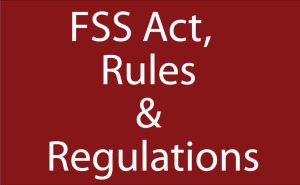
On 16th September, 2015, the Bombay High Court in a notable judgement upheld the constitutionality of the Food Safety and Standards (FSS) Act 2006. A number of merchant, trader and hotelier associations moved the Bombay High Court by calling into question the provisions of the FSS Act 2006 as being beyond the powers of the constitution of India. The argument was that the provisions of the Act were unclear and impractical and that unrestricted and unguided powers were conferred by the Act on the relevant authorities that could easily be abused. It was further added that the Act grossly suffered from the fact that the standards and regulations were laid down predominantly by the executive side.
The Court observed that the petitions were half-cooked and anticipatory in nature and that none of the petitions had factual allegations that rendered the Act to be causing any serious civil consequences resulting from its implementation. The Bombay High Court cited the Supreme Court’s judgement in the Sant Lal Bharati vs. State of Punjab (1988) 1 SCC 366 in this regard.
The Court examined the FSS Act with the legislative backdrop and indicated that it was a consolidation of all previous laws pertaining to food safety and standards, including the Prevention of Food Adulteration Act 1954, the Essential Commodities Act 1955 etc. The Court opined that since this was a welfare legislation, the provisions of the Act should be viewed in the light of welfare and beneficial purposes to human beings, citing the Preamble, Section 18, and Sections 26 & 27. Prior to examining the specifics of the dispute, the Court also cited the Supreme Court judgement on the State of Uttar Pradesh vs. Kartar Singh AIR 1964 SC 1135, with reference to constitutionality of the Prevention of Food Adulteration Act, which was present prior to the FSS Act. The dispute was put under judicial scrutiny. In particular, the Sections 31 & 36, pertaining to the appointment of a designated authority was fiercely contested, which the Court rejected as these were unfounded after examining the facts.
Another contention pertaining to the Act referred to some vague expressions of business operators, which the Court also rejected as untenable since it opined that these terms were not vague and were established terms that had to be seen in the entire context of the FSS Act. It cited the Constitutional Bench decision of the Supreme Court in Sakhawant Ali vs. State of Orissa AIR 1955 SC 166 in this regard. It also repelled the submissions pertaining to licensing conditions under Section 31. Moreover, dispute raised against conferring excessive coercive powers to the designated authorities were also repelled by the Court, citing that in case of adulterated food, which would pose adverse health risk, there was a need to confer special powers so that in emergency conditions, the legislation could be properly implemented and the culprits punished appropriately. Citing the observations of the Supreme Court in Centre for Public Interest Litigation vs Union of India and others AIR 2014 SC 49, the Bombay High Court indicated that the Act was framed in order to confer protection to health and well-being of human beings. It further added that any adulterated hazardous food can be a threat to the fundamental right to life. It indicated that the FSS Act was a mechanism to implement Article 47 of the Constitution of India which ensures that the State raises the level of nutrition and standard of living for the benefit of public health in India.
The Bombay High Court concluded that the FSS Act was valid and was a necessary legislation to check the rampant evil of misbranding and adulteration of food items, which was a great threat to public health, and that the Act was an essential mechanism to safeguard the health of the general public. Therefore, the Court dismissed the writ petitions, and indicated that the provisions of the FSS Act were legal, valid and in line with Articles 14 and 19 (1) (g) of the Constitution of India.
Leave a Reply